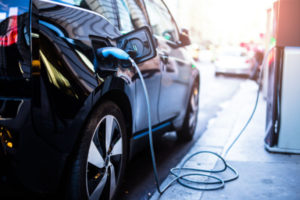The Electric Vehicle Discount is a Fringe Benefits Tax (FBT) exemption on certain cars, which has been implemented by the Government to encourage business fleets and other car owners to consider a ‘fuel efficient car’. There is also the intention that this will help build up the future second hand market for these vehicles.

The FBT exemption means that a car that is owned by a business, or a novated lease that is paid by the business on behalf of an employee, will not attract FBT. So an employee can salary package a fuel efficient car out of their pre-tax salary and generate income tax savings and the employer can save on FBT costs for providing fringe benefits. Some basic calculations are below.
What is a fuel efficient car?
The exemption applies to a vehicle that satisfies the following two conditions:
1. It is a car designed to carry a load of less than 1 tonne and fewer than 9 passengers (including the driver).
2. It is a:
- Battery Electric vehicle, or
- Hydrogen Fuel Cell vehicle, or
- Plug-in hybrid electric vehicle
It is important to note that a hybrid vehicle which does not require plugging in for recharging does not qualify for the exemption.
Does it apply to any fuel efficient car?
No. In addition to the type of car noted above, the car in question must:
- Have been delivered new after 1 July 2022; and
- Come under the fuel efficient luxury car limit of $84,916
In terms of the luxury car limit, it is a binary requirement, in that the car is either under or over the limit. There is no apportionment of the exemption for cars that are over the limit. Importantly, the limit of $84,916 is not as simple as the drive away price. It includes things like GST, customs duty, warranties, accessories and fleet rebates, but excludes Luxury Car Tax, stamp duty, transfer fees, registration, CTP, extended warranties and service plans.
Finally, at time of writing, the FBT exemption will cease to apply to plug-in hybrid vehicles from 1st April 2025.
What are the tax savings?
There are tax savings available for employers that are offering a fuel efficient car as a benefit, as well as employees that are utilising salary packaging. The calculations for the employer and employee that follow assume that the car has no business use, so is a 100% private use vehicle. Tax savings for the employer and employee will be different if there is business use of the vehicle.
Employer FBT savings
| What | Petrol Car ($) | Fuel Efficient Car ($) |
| FBT Valuation Method | Statutory Formula | Statutory Formula |
| Car | Toyota Corolla Cross GX Hybrid | BYD Atto 3 Standard |
| FBT Base Value | $48,631 | $49,304 |
| Taxable Value (20%) | $9,672 | 0 |
| FBT Liability | $9,456 | 0 |
| Annual; FBT Savings | $9,456 |
Employee FBT Savings
| What | With Salary Sacrifice ($) | Without Salary Sacrifice ($) |
| Gross remuneration | $150,000 | $150,000 |
| Pre-tax salary sacrifice (novated lease payments) | (15,600) | 0 |
| Cash salary | $134,400 | $150,000 |
| PAYG withholding | ($37,483) | ($43,567) |
| Net pay | $96,917 | $106,433 |
| After tax running costs (novated lease payments) | 0 | ($15,600) |
| Net | $96,917 | $90,833 |
| Annual savings | $6,084 |
In this example, the PAYG withholding is based on the 2023 resident tax rates, including 2% Medicare levy. The novated lease used is $300 per week, but each lease will vary depending on estimated kilometres for the year, assumed electricity price, inclusions/exclusions and residual value.
Reportable FBT issue
Although the provision of the fuel efficient car fringe benefit is FBT exempt, the Taxable Value of the benefit (calculated as if it weren’t exempt) counts as a Reportable Fringe Benefit Amount (RFBA). Whilst the employee doesn’t pay tax on the RFBA, it is still reported in the tax return and is taken into account for various rebates, thresholds and liabilities. For example, it can be included in working out a HECS-HELP compulsory study debt repayment.
Other tax issues
For the employer/business providing the benefit, if they choose to purchase the car outright, then they can reclaim GST up to the luxury car depreciation limit ($64,741) and any running costs.
Furthermore, if the vehicle is delivered and on-hand before 30 June 2023, there is an immediate deduction up to $64,741 for most businesses. However, this deduction is simply bringing forward several years of depreciation and when the vehicle is sold or traded-in, the business will need to declare a profit at that time in the future on the disposal value. After 30 June 2023, the car will be subject to normal depreciation rates and rules.
Are there many fuel efficient cars available in Australia?
As with most other goods, there have been stock supply and delivery issues with cars in Australia for the past few years now. Some cars have longer wait times than others and prices are regularly being increased. At the same time, there are new entrants into the EV & PHEV market. The Electric Vehicle Council has a list of EV & PHEVs here: https://electricvehiclecouncil.com.au/about-ev/evs-available/
For more information about the Electric Vehicle Discount Government Incentive and how you can become involved, get in contact with your Accru advisor.
